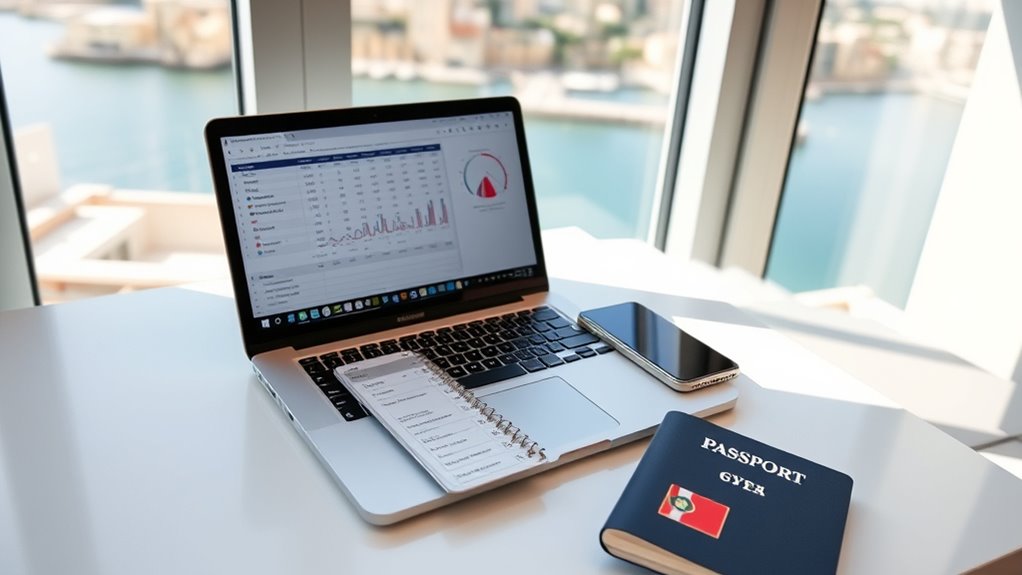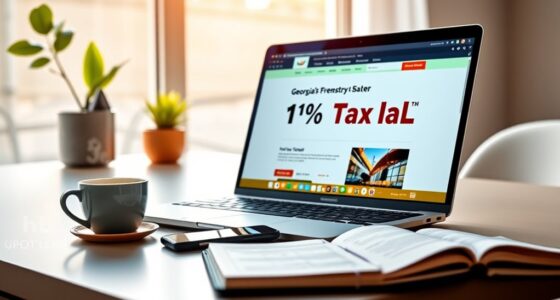With a Malta Nomad Permit, setting up a local bank account simplifies your finances and helps you manage international and local expenses more easily. Use online banking options and choose banks with minimal paperwork to save time. For billing, set up online payments or direct debits to stay on top of utilities and services. Budget carefully by understanding Malta’s costs for rent, food, and transportation, and track your spending to stay within your limits. Keep exploring to learn more ways to make your stay seamless.
Key Takeaways
- Research Maltese banks with online account opening options and minimal paperwork to facilitate easy access for remote workers.
- Set up automatic bill payments via direct debits for utilities and services to streamline financial management.
- Use digital wallets and international payment platforms to simplify transactions and avoid international fees.
- Budget by understanding local costs for rent, groceries, and leisure, using apps and community tips to plan effectively.
- Maintain a local Maltese bank account to easily manage expenses, access services, and adapt to the cost of living.

Are you looking for a flexible way to work remotely from a beautiful Mediterranean island? Malta’s Nomad Permit makes it easier than ever to embrace remote work while immersing yourself in a vibrant, welcoming environment. As a newcomer, you’ll find Malta has a thriving digital nomad community, offering opportunities to network, share experiences, and get advice on managing your finances effectively. Being part of these communities helps you stay connected and informed, especially when it comes to banking, billing, and budgeting in a new country.
Setting up a local bank account should be at the top of your list. Malta offers several banking options tailored for expats and remote workers, making it straightforward to access your funds both locally and internationally. Many banks allow you to open accounts remotely or in person, but it’s wise to research which institutions require minimal paperwork and have user-friendly online banking platforms. This way, you can manage your finances efficiently, pay bills, and transfer money without hassle. Keep in mind that having a Maltese bank account can also help you avoid international transaction fees and give you easier access to local services.
Opening a Maltese bank account simplifies managing finances and accessing local services effortlessly.
When it comes to billing, it’s essential to understand how local utilities and service providers operate. Many companies in Malta accept online payments, so setting up direct debits or standing orders can save you time and help you stay on top of your bills. The digital nomad communities often share tips on which providers offer the best rates and most reliable service. It’s worth comparing options for internet, electricity, and water to find a plan that suits your budget. Also, consider using international payment platforms or digital wallets for added convenience, especially if you’re dealing with clients or companies outside Malta.
Budgeting as a remote worker in Malta involves understanding local costs and planning accordingly. While Malta can be affordable compared to many Western European countries, expenses vary depending on your lifestyle. You’ll want to allocate funds for rent, groceries, transportation, and leisure activities, all while leaving some buffer for unexpected costs. Digital nomad communities are a goldmine for such advice—they often share real-life experiences and recommendations on how to stretch your budget. Using budgeting apps can help you track expenses, set spending limits, and ensure you don’t overspend. Additionally, understanding the cost of living in Malta can help you plan more effectively, allowing you to enjoy all that the island has to offer without financial stress, making your remote work experience both productive and enjoyable.
Frequently Asked Questions
What Are the Tax Implications of the Malta Nomad Permit?
With a Malta Nomad Permit, you might enjoy certain tax exemptions, especially if you’re not earning income within Malta. However, you still need to report your worldwide income to avoid penalties. You should understand how Malta’s tax laws apply to your situation, as some income could be taxable while other earnings might be exempt. Always stay informed about your income reporting obligations to guarantee compliance and optimize your tax position.
Can I Open a Local Bank Account Remotely With This Permit?
You can typically open a local bank account remotely with your Malta Nomad Permit, making online account setup possible. Most banks now offer remote banking options, allowing you to complete the process without visiting in person. However, you’ll need to provide necessary documents like proof of address and identification. Be prepared for some banks to require a visit for final verification, but overall, remote banking is accessible and convenient for newcomers.
Are There Specific Billing Practices for Digital Nomads in Malta?
You should be aware that billing practices for digital nomads in Malta typically follow standard invoicing standards, with most providers offering monthly billing cycles. You’ll want to guarantee your invoices include clear details like your services, dates, and amounts to comply with local requirements. Some companies may offer flexible billing options, but it’s best to confirm their invoicing standards and billing cycles upfront to avoid surprises.
How Do I Budget for Healthcare and Insurance Costs?
Did you know that healthcare expenses can vary widely, with insurance premiums often making up a significant part of your budget? To plan effectively, research local insurance options and compare costs. Set aside a monthly amount for premiums and unexpected healthcare costs. Keep track of your medical expenses, and consider supplementary coverage if needed, so you’re prepared without overspending. Budgeting wisely helps you stay healthy and financially secure abroad.
What Are the Best Budgeting Tools for Long-Term Stay?
When choosing budgeting tools for a long-term stay, you should consider user-friendly options like budgeting apps and expense trackers. These tools help you monitor your spending, set savings goals, and stay within your budget. Look for features like automatic transaction syncing and customizable categories. Using these apps, you’ll gain better control over your finances, making it easier to manage your money and enjoy your stay without financial stress.
Conclusion
Now that you’ve got the essentials on banking, billing, and budgeting, you’re almost ready to fully embrace life in Malta. But there’s one more detail that could make all the difference—something you won’t want to miss. Stay tuned, because once you discover this final piece of the puzzle, your Malta nomad experience will transform from good to unforgettable. Are you ready to *unleash* the full potential of your new adventure? The best is yet to come.









